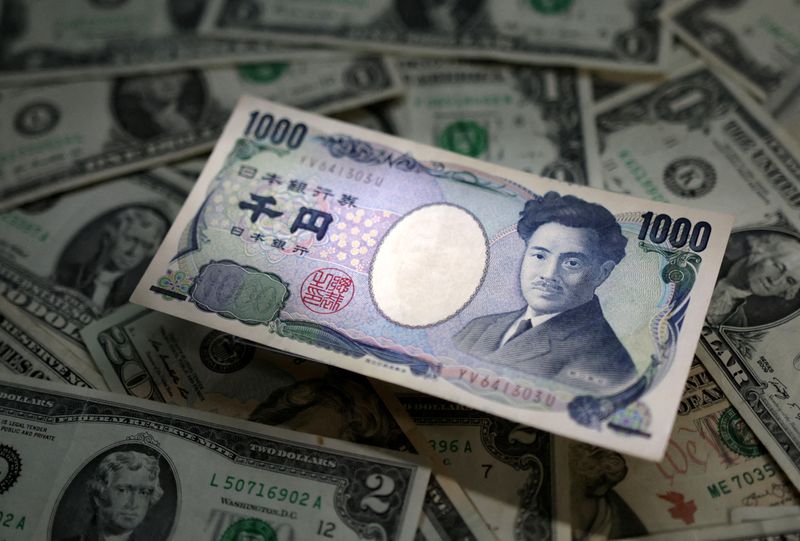
Leika Kihara and Makiko Yamazaki
TOKYO (Reuters) – The yen’s fall to new 34-year lows is likely to force Bank of Japan Governor Kazuo Ueda to tread a delicate line on monetary policy this week as he tries to maintain a calibrated path to exiting ultra-loose interest rates without flipping the currency. .
The Bank of Japan governor will try to avoid a 2022 episode when his predecessor’s dovish remarks triggered a fall in the yen, forcing Tokyo to intervene to support the currency.
Ueda ruled out the possibility of aggressive rate hikes due to Japan’s fragile economy, which in part fueled expectations of low, long-term rates and emboldened yen bears.
However, in recent comments, Ueda hinted that the Bank of Japan may raise borrowing costs again later this year, although this is unlikely to reverse the yen’s inexorable fall over the past few months.
The Bank of Japan is expected to keep interest rates steady at a two-day meeting ending Friday and forecast inflation will remain near its 2% target in coming years amid prospects for robust wage growth.
The prospect of Japanese rates remaining low for an extended period, as well as expectations of a delayed start to US rate cuts, continue to weigh on the yen, despite aggressive criticism from Japanese authorities.
The yen fell below 155 to the dollar on Thursday, a level seen by authorities as a line in the sand raising the possibility of currency intervention.
The dollar rose to 155.37 yen on Wednesday, its highest level since mid-1990, before falling again in choppy trading. It was last at 155.29 in Asia on Thursday.
remove advertising
.
“Our position will not change. We will closely monitor market movements and respond accordingly,” Finance Minister Shunichi Suzuki told parliament on Thursday as an opposition lawmaker called on him to intervene in the foreign exchange market.
Chief Cabinet Secretary Yoshimasa Hayashi also said Japanese authorities were ready to take action as needed.
“It is important that exchange rates move steadily, reflecting fundamentals. Excessive volatility is undesirable,” Hayashi said at a press conference. He declined to comment on the yen’s recent movements or the possibility of currency intervention.
Markets are focused on whether the Bank of Japan’s Ueda will take a more hawkish tone on the prospect of near-term interest rate hikes.
“The Bank of Japan will not raise rates just to prevent the yen from falling,” said former Bank of Japan official Nobuyasu Atago.
“But he may repeat his recent comment that the Bank of Japan will react if the yen’s movements have a big impact on the economy and prices. If this leaves markets wondering when the timing of rate hikes might be pushed back, that would be an effective criticism.”
Ueda will hold a news conference after the two-day meeting ends on Friday.
REPEAT 2022?
Some analysts point to the risk of a repeat of September 2022, when Japan intervened to support the yen after it fell following remarks by former Bank of Japan Governor Haruhiko Kuroda following a meeting that emphasized the bank’s determination to maintain ultra-loose policy.
In Japan, the Ministry of Finance, rather than the Bank of Japan, is responsible for deciding whether to intervene in the foreign exchange market. The decision is highly political and typically reflects the administration’s view of whether the yen’s movements justify any action.
remove advertising
.
However, there appears to be no consensus within the ruling Liberal Democratic Party (LDP) on whether the time has come for currency intervention.
Japan’s ruling party is not yet actively discussing what level of the yen would be considered appropriate to intervene in the market, although the currency’s depreciation to 160 per dollar could spur policymakers to act, party leader Takao Ochi told Reuters.
Markets are also focused on whether the Bank of Japan will leave unchanged recommendations it proposed in March to continue buying government bonds at the current pace of 6 trillion yen a month.
Analysts said the reversal or change in guidance could be interpreted by markets as suggesting the Bank of Japan will soon scale back bond purchases to allow bond yields to rise further.
Alternatively, the Bank of Japan could announce a slight cut in its bond buying plans for May, which will be released after its policy meeting, some analysts said.
Speaking at a seminar in Washington, Ueda said last week that the Bank of Japan will eventually begin to shrink its balance sheet and reverse the process regardless of the state of the economy.
But Ueda stressed that the Bank of Japan will not yet radically change the pace of bond purchases and will not use the size of asset purchases as a monetary policy tool.


